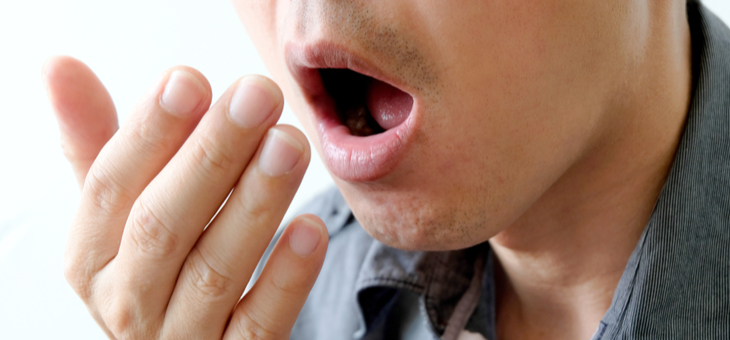Bad breath – it happens to all of us. Often, it’s a friend or family member who’s brave enough to let us know that our breath is on the odorous side. ‘Morning breath’ or ‘garlic breath’ are embarrassing but – fortunately – temporary. However, some people suffer from persistent bad breath, which may have a more sinister cause.
Halitosis is Latin for bad breath, and most often occurs in the morning, after drinking alcohol, smoking or eating a garlicky meal. Chronic bad breath is often associated with poor oral hygiene and may be caused by bacteria in the mouth or on the tongue. Other conditions, such as dry mouth and gum diseases, may also be the cause. For most people, dental or gum problems are the cause of bad breath.
In some rare cases, bad breath can be a sign of something more serious. While advanced liver disease, uncontrolled diabetes, sinusitis, bronchitis or gastrointestinal diseases are associated with bad breath, you will likely experience it along with a range or more troubling symptoms. If you suspect you have any of these conditions, consult your GP.
To diagnose the source of bad breath, your dentist will scrape the back of your tongue, where most odour originates, and rate its smell on a predetermined scale. They will then test to find out which chemicals or bacteria are responsible for the bad breath, which will help to inform a treatment plan. To prepare for one of these appointments, avoid wearing any perfumes or scents, as these may interfere with the test. If you have been on antibiotics in the past month, call up and let your dentist know before your appointment as this may interfere with the test results. Remember to book this appointment in the morning, to lower the risk of your diet and food interfering with the exam.
If your bad breath is not caused by something more serious, your treatment plan will likely involve using a recommended toothpaste and mouthwash to kill off bacteria. If your dentist discovers gum disease, you will be referred to a specialist called a periodontist. Gum disease can cause your gums to pull away from your teeth, leaving gaps in which bacteria builds up. In order to remove this bacterium from your teeth and gums, you may have to have them professionally cleaned.
How to improve bad breath
- maintain good oral hygiene
- floss daily
- brush your teeth after every meal, using a fluoridated toothpaste
- brush your tongue. This can help to reduce odours and bacteria build-up
- visit your dentist regularly
- if you smoke or chew tobacco, stop
- gargle alcohol-free mouth wash before going to bed
- stay hydrated, especially if you are prone to dry mouth
- replace your toothbrush every three to four months
- adjust your diet to reduce foods like onions and garlic
- clean your dental appliances including dentures, mouthguards and retainers once a day.
Some people who objectively do not have bad breath, believe firmly that they do, even after reassurance from a doctor or dentist. This is known as ‘pseudo-halitosis’, or halitophobia. If this condition is impacting your lifestyle or self-esteem, you may benefit from speaking to a counsellor.
Do you feel insecure about your breath? Have you ever had someone point out your bad breath?
If you enjoy our content, don’t keep it to yourself. Share our free eNews with your friends and encourage them to sign up.
Related articles:
https://www.yourlifechoices.com.au/health/your-health/your-dentist-wants-you-to-know-this
https://www.yourlifechoices.com.au/health/your-health/how-to-breathe-for-joy-and-vitality
https://www.yourlifechoices.com.au/health/your-health/lower-your-risk-of-oral-cancer
Disclaimer: This article contains general information about health issues and is not advice. For health advice, consult your medical practitioner.

